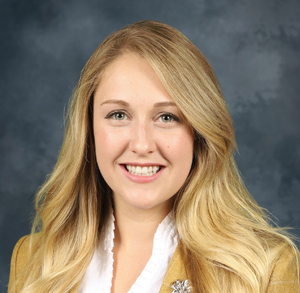From boots to suits |
| Jan. 7 2019 |
| By Christy Achen, 2018 Hoard's Dairyman Editorial Intern |
These “farm kids” turned lawyers defend how their agricultural upbringing helped them through law school and in their chosen careers.The author was the 2018 Hoard’s Dairyman editorial intern and is a senior at Utah State University majoring in agricultural communications and journalism.Job titles in the agricultural community are vast. There are many different careers and people that work together to produce a safe food supply for humans and livestock. Moving food from farm to table incorporates multiple hands and minds. One of those minds is a lawyer, a job title many students don’t think of when they consider an agricultural career. Anna Jordan, policy and outreach coordinator of Drake University Agricultural Law Center and a recent graduate in agricultural law, explained that there is a profound shortage of attorneys available to serve rural communities. She went on to explain the variety of opportunities available for young people “There are many ways to use a legal education. Examples include disputing contracts and property rights, marketing, food production, international trade, advocation for nonprofits, providing resources to the public on law and policy, and so forth,” she said. From her experience, she noted that graduates of agricultural law should understand the regulations specific to farming and land use. However, not many colleges offer this emphasis; University of Arkansas, Vermont Law School, and Drake University are a few. In fact, two of the lawyers interviewed for this article took limited classes related to agriculture and environmental law. Nevertheless, they both believe their dairy farming backgrounds have given them perspective on many of the cultural realities and challenges of rural America. Hard work ethic shows  Gary Leistico He said, “Every day changes, you go wherever the files take you.” He might be in court for one day and visiting with farmers or other clients the next, or he might even be traveling to a different state. Since Leistico has law licenses for Minnesota, North Dakota, South Dakota, Wisconsin, and Iowa, he works in all of those states. However, without a doubt, his favorite part of the job is working with his clients, who may be landowners, dairy farmers, or agribusiness owners. “Over 80 percent of the time, I am dealing with ag issues that range from dairy, swine, poultry, and crops to the environment and water laws,” he shared. His 25 years and counting of experience as an attorney were preceded by growing up on a dairy farm near Elk River, Minn., with his three brothers and one sister. The family milked 150 Holsteins in a stanchion barn along with raising 150 head of young stock, and the Leisticos owned 300 acres of cropland as well. Just like many dairy youth today, Leistico was heavily involved in 4-H, FFA, and showing dairy cattle. He gained valuable skills from his time spent on the farm and while participating in these organizations. “Growing up on a farm you realize that work is all the time, and you always have to be considering the farm. If someone is working, everyone else should be working to help get that job done,” explained Leistico. “Practicing law is similar to dairy farming in that it is a team effort.” Leistico didn’t know he would eventually attend law school. Out of high school, he worked on the farm for a couple years and then enlisted in the Army for six years. When he went to college, he had his sights set on law enforcement and got his bachelor’s degree in criminal justice. What really pushed him to go to law school was the palpable impact he could make. “I like to be able to make a difference and not be sitting on the sideline,” he said. “As a lawyer, I am able to assist farmers and others and make a real difference.” While in law school, Leistico had a job with the USDA Agriculture Stabilization and Conservation Service, now a part of the Farm Service Agency (FSA). He also took an internship with the U.S. Attorney’s Office. For anyone in law school, he recommends taking these opportunities. “Get the experience and get inside the area of law you think you want to practice. You may find you are interested in that area or you may find that you are not,” said Leistico. “You don’t know until you try; let yourself try something new, and don’t be afraid to fail.” Leistico shared that when he is hiring new team members, he genuinely likes to hire people with a dairy or agricultural background. He knows that they have the work ethic and valuable life experiences that are hard to find from anywhere else. Putting skills to use  Leah Ziemba “Dairy judging allowed me to practice for defending my position and taught me to speak with confidence and authority when doing so,” explained Ziemba. “You place the class and then try to convince an official why you saw them that way. It is very similar to talking to a judge in the courtroom.” While completing her bachelor’s degree, Ziemba thought she would become a veterinarian. However, she found herself gravitating toward more of her government, environmental, and law classes. “I saw how environmental matters were changing the shape and dynamic of the dairy industry, and I wanted to be a part of that,” said Ziemba. “I worked for two years after I graduated from college for the New York Farm Bureau as a lobbyist and policy analyst. I wanted to be sure that I wanted to go back to law school.” She noted that law students come from a variety of backgrounds. Her animal science degree helped prepare her for the technical and analytical writing in law school. Ziemba received her law degree from Syracuse University and has been a practicing attorney for 12 years. She is currently a partner at Michael Best, in Madison, Wis., where she co-chairs the agribusiness, food, and beverage industry group. Her most important advice for students is this: “Do your due diligence and understand the financial cost of going to law school, and pencil out what kind of job you want. Not every job requires a law degree, and some may not be worth the opportunity cost of going to law school.” Ziemba attests that the habits of preparation, planning, and consistent daily effort she picked up from farming helped her earn her degree. For students interested in agricultural law, job opportunities are most definitely there, and a background in dairy will certainly help you with your education and career goals. Tips from a recent graduate  Anna Jordan Bachelor’s degree — Don’t worry about having a “prelaw” degree. Focus on learning about things that interest you and shape your legal studies around that topic. Internships — The law is vast, use internships to explore interests and to expose yourself to new things. Personal statement — Many schools do not hold an interview process for law school admissions. The personal statement is an important tool for applicants to set themselves apart. |
